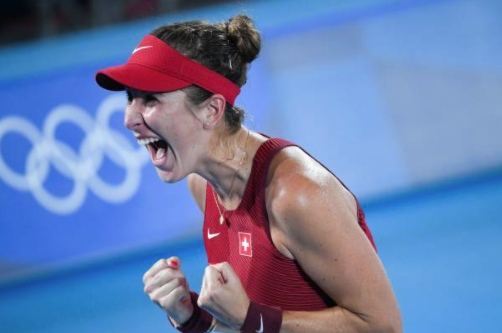 |
| Belinda Bencic of Switzerland as 2020 Tokyo Olympic gold medalist in women's tennis |
Belinda Bencic of Switzerland fought through every point to become a gold medalist at the Tokyo 2020 Olympics Saturday night. The ninth seed had to go three sets with Marketa Vondrousova of the Czech Republic, who ran out of gas in a 7-5, 2-6, 6-3 result on center court at the Ariake Tennis Park. The 22-year old left home with the silver and Elina Svitolina of Ukraine won bronze in her three-set fight over Elena Rybakina of Kazakhstan.
The Olympic gold medal was on the line in their third career meeting neither one will ever forget. Both hold a win over the other, with the Czech winning their last meeting on the hardcourt. With that being a major factor due to Bencic’s win over Vondrousova coming on clay, the 22-year-old knew how to fight the Swiss star and possibly be a gold medalist in the match. The ninth seed was not to be counted out, as she dealt with three full matches coming to this point. With that experience against the Czech, she had just as good a chance to be golden herself.
Bencic made a statement early, earning a hold of serve, and followed it up with a break of Vondrousova. The unseeded Czech broke back and successfully held the fourth on serve. The two got into a heavy fight for control in the fifth, where Vondrousova forced deuce with the score level. They played over eight minutes and five breaks until the 22-year-old scored the double break.
Bencic followed suit with one of her own, taking back the lead with hard work from her service game. The score remained close as Vondrousova held in the eighth, making sure she stayed close on the scoreboard with the ninth seed. When they reached the business end of the set, Bencic set the pressure in place for Vondrousova, who had to hold serve or be a set down. She forced the Swiss star to fight for deuce, but an error leveled the score at five-all when the Czech reached the first AD point.
Every hold was critical for the two as Bencic proved the point in the 11th. Her attempts to avoid a set tiebreak were successful as she held Vondrousova to a point before taking two set points and closing out the first in 59 minutes. The drop shot forehand worked out for the Swiss star, who despite having 16 unforced errors, kept the double faults minimal and the winners high.
The strong finish she put together, didn’t pan out on her opening serve with Vondrousova going after her opponent’s second serve. Bencic forced deuce but remained under pressure with the Czech fighting through the next three breaks. It was at the end that she gained an AD point to secure the break of serve. She consolidated it with a hold in the second but watched Bencic get into the set.
She struggled to produce more than that as Vondrousova aimed at the Swiss star’s weakness on second serve and soon have a 4-1 grip of the set. With another double break in hand, Vondrousova made it 5-1, viewing the third set on the horizon. Bencic extended the set one more game with an important service, but as three games stood between herself and leveling, stopping the Czech was another key moment to achieve. The 22-year-old denied her a break and secured the eighth game to force a decider after 40 minutes where the color of the medal would be determined.
Vondrousova opened the decider with a break of Bencic, increasing the confidence that she had the Swiss falling further out of contention in the match. The 24-year-old responded with a break back and consolidated in the third with a hold. She went on to take a 3-1 lead on the Czech, who made the transition to her game but couldn’t complete the conversion. Once she did, it led to a cut into Bencic’s lead and served the sixth to level the score.
Bencic pressed Vondrousova in the seventh that helped her break the 22-year-old and held after getting her big toe taped up for a blister. With the 5-3 lead and serving for the gold medal, Bencic fell behind with Vondrousova gaining break point chances. The Swiss saved one and forced deuce on a net-front winner. A forced error from the Czech brought up a gold medal point, but a solid return from Vondrousova brought the score back to deuce.
 |
| Belinda Bencic celebrates during the gold medal match with Marketa Vondrosova. |
On the second break, the Czech gained an AD point but knocked one into the net on the return. The ninth seed ran after every ball that left an error for Vondrousova to commit bringing up a second point. Vondrousova delivered a shot long of the baseline that clinched the win for Bencic, who fell back and let the emotions run after a 2 hour and 28-minute battle.
“It’s amazing,” said Bencic during her on-court interview after the match. “I really cannot believe it right now. I just don’t get it yet. I don’t know whether to laugh or cry and I didn’t think it would be possible. I was fighting for my life and it worked out and can’t believe it worked out.”
“Marketa made me work so hard and she knew I played so much tennis this last week so she was trying everything to keep the rallies long and make me work really hard for it. She’s a really good defensive player so I tried to push and it was a balance of risk and pushing her enough so she didn’t come back.”
The Swiss star had the chance to win two medals in Tokyo and win a second gold in women’s doubles with teammate Viktorija Golubic on Sunday.












